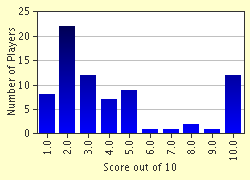Quiz Answer Key and Fun Facts
1. [NB: throughout this quiz I will use "dh" to represent the Icelandic letter eth, which represents the hard-th sound of modern English.] The opening seven "chapters" of Laxdaela Saga tell the story of what important early settler of Iceland?
2. In many ways the most important character of Laxdaela Saga is Gudhrun Osvifsdottir. Three out of four of the following enumerated actions are among the many feats and deeds attributed to Gudhrun: (a) she took on all the de facto authority of a chieftain after arguing and winning a lawsuit at the "Althing" against the wealthiest and most powerful landowner in the district; (b) she became a rich and independent woman before the age of eighteen by marrying a man after obtaining a very favorable prenuptial contract, then divorcing him for good cause after tricking him into violating a cross-dressing taboo; (c) she taunted her thirteen year-old son for not challenging the ten doughty warriors who slew his father, by displaying his father's blood-stained clothes; (d) she tricked a man into committing murder on her behalf by promising to marry "no man in the land" other than he, then marrying a different man who happened to be out of Iceland at the time the promise was made. Which of the four foregoing actions is NOT among the actions attributed to Gudhrun?
3. In Burnt Njal's Saga, Hallgerdh Hoskuldsdottir is slapped by her husband on three occasions. Which of the following actions does she NOT take in response?
4. In Burnt Njal's Saga, with whom does the impetuous Hallgerdh carry on a feud that is arguably the bloodiest of any described in the entire saga corpus?
5. One very standard role for women in the sagas is to egg men on (Old Norse "eggja") into doing their duty in the blood feud by taking violent action against those who have slain their relatives. In Burnt Njal's Saga, who is it that incites Flosi Thordsson to take blood vengeance on Njal and his kin?
6. Thorgerdh Egilsdottir is a significant minor character in two sagas, Laxdaela Saga and Egil's Saga. In Egil's Saga, she saves her father's life. How does she do it?
7. In Eyrbyggja Saga, how does the housewife Audh respond when fighting breaks out on her land?
8. For what was the widow Katla best known, according to Eyrbyggja Saga?
9. In Grettir's Saga, how does Thorbjorn's foster-mother Thuridh help Thorbjorn "Angle" Thordsson slay the outlaw Grettir Asmundsson?
10. In Gisli's Saga, Eyjolf Thordharsson asks the wife of Gisli Sursson (Audh Vesteinsdottir) to reveal the whereabouts of her outlaw husband in exchange for money. What is Audh's response?
Source: Author
xaosdog
This quiz was reviewed by FunTrivia editor
bullymom before going online.
Any errors found in FunTrivia content are routinely corrected through our feedback system.

